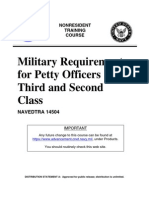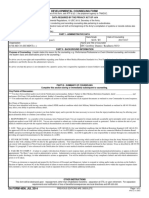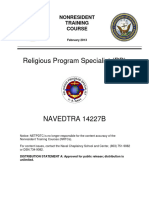Platoon Sergeant Counseling
Platoon Sergeant Counseling
Uploaded by
Gbenga AdenekanCopyright:
Available Formats
Platoon Sergeant Counseling
Platoon Sergeant Counseling
Uploaded by
Gbenga AdenekanOriginal Title
Copyright
Available Formats
Share this document
Did you find this document useful?
Is this content inappropriate?
Copyright:
Available Formats
Platoon Sergeant Counseling
Platoon Sergeant Counseling
Uploaded by
Gbenga AdenekanCopyright:
Available Formats
DEVELOPMENTAL COUNSELING FORM
For use of this form, see ATP 6-22.1; the proponent agency is TRADOC.
DATA REQUIRED BY THE PRIVACY ACT OF 1974
AUTHORITY: 5 USC 301, Departmental Regulations; 10 USC 3013, Secretary of the Army.
PRINCIPAL PURPOSE: To assist leaders in conducting and recording counseling data pertaining to subordinates.
ROUTINE USES: The DoD Blanket Routine Uses set forth at the beginning of the Army's compilation of systems or records notices also
apply to this system.
DISCLOSURE: Disclosure is voluntary.
PART I - ADMINISTRATIVE DATA
Name (Last, First, MI) Rank/Grade Date of Counseling
McIntyre, Amanda SGT/E5 20180122
Organization Name and Title of Counselor
526th QM CSC, 8360 Wells Street Fort Riley KS 2LT Adenekan, Gbenga/ POL PLT LDR
PART II - BACKGROUND INFORMATION
Purpose of Counseling: (Leader states the reason for the counseling, e.g. Performance/Professional or Event-Oriented counseling, and includes the
leader's facts and observations prior to the counseling.)
Platoon Sergeant Initial Counseling.
PART III - SUMMARY OF COUNSELING
Complete this section during or immediately subsequent to counseling.
Key Points of Discussion:
SGT McIntyre, Amanda, this is your initial counseling as my Acting Platoon Sergeant. The platoon sergeant is the key assistant and adviser to the platoon leader. In the
absence of the PL the PSG leads the platoon. You primary focus is to manage training, enforce discipline, promote the health and welfare of Soldiers, teach, coach and
mentor junior NCOs in the execution of their managerial duties. Other obligations required of your position are, but not limited to these expectations, they includes
enforcing safety and environmental protection procedures especially with petroleum products, environment protection compliance, spill prevention and to perform
administrative duties. Ref (AR 600-20)
Formation and Accountability: It is the duty of the squad, section and team leader to account for his soldiers and ensure that they receive necessary instructions and are
properly trained to perform their jobs.
Training: This will not be limited to POL specific, but will include military customs, courtesies, and tradition as well as basic skills and attributes of a Soldier.
Other Focus: Army Weight Prog (AR 600-9), Wear and Appearance (AR 670-1), Physical fitness (AR 7-22-2) will be a focus for the squad leaders and below and they
will be held responsible for the performance of their Soldiers in APFT and during PT hours.
Duties: Platoon Sergeants have three types of duties: specified duties, directed duties and implied duties. Specified duties are those related to jobs and positions.
Directed duties are not specified as part of a job position or MOS or other directive. I may give them orally or in writing. Implied duties often support specified duties,
but in some cases they may not be related to the MOS job position. These duties may not be written but implied in the instructions. They’re duties that improve the
quality of the job and help keep the unit functioning at an optimum level. In most cases, these duties depend on individual initiative. They improve the work
environment and motivate soldiers to perform because they want to, not because they have to.(AR 600-20)
Responsibility: PSG are responsible to fulfill not only their individual duties, but also to ensure junior managers are successful. As an NCO, you are accountable for
your personal conduct and that of your soldiers (AR 600-20). As a leader you must ensure that junior leaders clearly understand their responsibilities as members of the
leadership team and as representative of the Army. Commanders set policies and standards and leaders provide the guidance, resources, assistance and supervision
necessary for soldiers to perform their duties. Mission accomplishment demands that officers and NCOs work together to advise, assist and learn from each other.(AR
600-20)
Authority: As a noncommissioned officer, you must know what authority you have and where it comes from. You are also expected to use good judgment when
exercising your authority.(AR 600-20)
Quarterly Counseling for NCO: Your counseling will evaluate junior managers in the areas of character, presence, intellect, achievements, leadership, discipline, squad
APFT average and total number of MOS trainings conducted quarterly. It most be supported by documentation and be quantifiable reference (Ref AR 623-3)
Family Care Plan:This is the means by which Soldiers provided for the care of their family when military duties prevent them from doing so. All dual military and
Single parents will complete and turn in a family care plan to the commander with proof that guardians and escorts have been fully briefed on the responsibility they
assume for the Soldier. Ref (AR 600-20 Chap 5-5).
OTHER INSTRUCTIONS
This form will be destroyed upon: reassignment (other than rehabilitative transfers), separation at ETS, or upon retirement. For separation requirements
and notification of loss of benefits/consequences see local directives and AR 635-200.
DA FORM 4856, JUL 2014 PREVIOUS EDITIONS ARE OBSOLETE. Page 1 of 2
APD LC v1.04ES
Plan of Action (Outlines actions that the subordinate will do after the counseling session to reach the agreed upon goal(s). The actions must be
specific enough to modify or maintain the subordinate's behavior and include a specified time line for implementation and assessment (Part IV below)
1. Counsel Platoon Sergeant on expectation and duties of junior leaders.
2. PSG will be accountable for all indiscipline within the NCO ranks.
3. The PSG is the only Leader to recommend for promotion board.
4. Training will be taught and AARs will be conduct on every training.
5. PSG will enforce the chain of command
6. All junior leaders will be in every formation with squads
7. PSG will be responsible for NCO accountability with appointments as proof for absence.
8. Open door policy will be enforce through the chain of command. The chain of Command is PSG, 1SG, PL LDR, Company Commander and higher.
9. Quarters and Convalescent Leave will be approved by the commander prior to the soldier leaving to go home. All NCOs on quarter will be back at work at 0615 for
accountability formation.
10. Memorandum of record will be kept and counseling will be given for any infraction that leads to indiscipline and unexcused absence.
Session Closing: (The leader summarizes the key points of the session and checks if the subordinate understands the plan of action. The subordinate
agrees/disagrees and provides remarks if appropriate.)
Individual counseled: I agree disagree with the information above.
Individual counseled remarks:
Signature of Individual Counseled: Date:
Leader Responsibilities: (Leader's responsibilities in implementing the plan of action.)
1. You can exercise open door policy at any time with me or higher.
Signature of Counselor: Date:
PART IV - ASSESSMENT OF THE PLAN OF ACTION
Assessment: (Did the plan of action achieve the desired results? This section is completed by both the leader and the individual counseled and
provides useful information for follow-up counseling.)
Counselor: Individual Counseled: Date of
Assessment:
Note: Both the counselor and the individual counseled should retain a record of the counseling.
DA FORM 4856, JUL 2014 Page 2 of 2
APD LC v1.04ES
You might also like
- Initial Counseling (NCOs)Document6 pagesInitial Counseling (NCOs)Fernando Garcia GarduñoNo ratings yet
- SITXHRM009 Assessment 1 - Short AnswersDocument13 pagesSITXHRM009 Assessment 1 - Short AnswerssolucionesredesecNo ratings yet
- Walker, Dylan SPC/E-4 20210801: Developmental Counseling FormDocument2 pagesWalker, Dylan SPC/E-4 20210801: Developmental Counseling FormNicole MalinowskiNo ratings yet
- AFM Vol1 Pt8 Command and Staff Procedures PDFDocument239 pagesAFM Vol1 Pt8 Command and Staff Procedures PDFKebede Michael100% (9)
- NCO Counseling ChecklistDocument4 pagesNCO Counseling ChecklistCurtis SteinekeNo ratings yet
- Depart With Dignity Aide MemoireDocument8 pagesDepart With Dignity Aide MemoireDocent105No ratings yet
- IMS-PRO-004-VER-00 - Training Management ProcedureDocument12 pagesIMS-PRO-004-VER-00 - Training Management ProcedureDINESH KUMARNo ratings yet
- Joint Leadership: Leading in a Joint and Combined Military OrganizationFrom EverandJoint Leadership: Leading in a Joint and Combined Military OrganizationNo ratings yet
- Developmental Counseling Form: Leader's Facts and Observations Prior To The Counseling.)Document2 pagesDevelopmental Counseling Form: Leader's Facts and Observations Prior To The Counseling.)Deontaye BibbsNo ratings yet
- Developmental Counseling Form: Leader's Facts and Observations Prior To The Counseling.)Document2 pagesDevelopmental Counseling Form: Leader's Facts and Observations Prior To The Counseling.)JesseKentNo ratings yet
- Conduct Initial Counseling and Expectations As An NCO and SoldierDocument5 pagesConduct Initial Counseling and Expectations As An NCO and SoldierPaul BohannonNo ratings yet
- Initial PL CounselingDocument2 pagesInitial PL CounselingEverett Anderson100% (1)
- 1ABG Guidelines USAF BadgesDocument31 pages1ABG Guidelines USAF BadgesJesus E. DelgadoNo ratings yet
- US Navy Course NAVEDTRA 14504 - Military Requirements For Petty Officers Third and Second ClassDocument199 pagesUS Navy Course NAVEDTRA 14504 - Military Requirements For Petty Officers Third and Second ClassGeorges100% (3)
- U.S. Army Reconnaissance and Surveillance HandbookFrom EverandU.S. Army Reconnaissance and Surveillance HandbookRating: 4 out of 5 stars4/5 (1)
- BijoynagarDocument21 pagesBijoynagarIndrajit MedhiNo ratings yet
- Astm e 4 - 16Document11 pagesAstm e 4 - 16Sarvesh Mishra100% (1)
- Entrance CounselingDocument2 pagesEntrance CounselingAndrew Skalecki100% (1)
- Developmental Counseling Form: Leader's Facts and Observations Prior To The Counseling.)Document2 pagesDevelopmental Counseling Form: Leader's Facts and Observations Prior To The Counseling.)Curtis SmithNo ratings yet
- Developmental Counseling Form: Leader's Facts and Observations Prior To The Counseling.)Document2 pagesDevelopmental Counseling Form: Leader's Facts and Observations Prior To The Counseling.)Deontaye BibbsNo ratings yet
- Developmental Counseling Form: The Leader's Facts and Observations Prior To The Counseling.)Document2 pagesDevelopmental Counseling Form: The Leader's Facts and Observations Prior To The Counseling.)Deontaye BibbsNo ratings yet
- Developmental Counseling Form: The Leader's Facts and Observations Prior To The Counseling.)Document2 pagesDevelopmental Counseling Form: The Leader's Facts and Observations Prior To The Counseling.)Deontaye BibbsNo ratings yet
- DA FORM 4856, JUL 2014: Previous Editions Are ObsoleteDocument2 pagesDA FORM 4856, JUL 2014: Previous Editions Are ObsoletebobNo ratings yet
- Developmental Counseling Form: The Leader's Facts and Observations Prior To The Counseling.)Document3 pagesDevelopmental Counseling Form: The Leader's Facts and Observations Prior To The Counseling.)Anonymous EpKfz0LNo ratings yet
- Initial Counseling1Document2 pagesInitial Counseling1Jason Fields100% (1)
- Developmental Counseling Form: Key Points of DiscussionDocument2 pagesDevelopmental Counseling Form: Key Points of DiscussionjessecpattonNo ratings yet
- Developmental Counseling Form: The Leader's Facts and Observations Prior To The Counseling.)Document2 pagesDevelopmental Counseling Form: The Leader's Facts and Observations Prior To The Counseling.)Elizabeth LongNo ratings yet
- Counseling DocumentDocument3 pagesCounseling Documentapi-309893739No ratings yet
- Developmental Counseling Form: The Leader's Facts and Observations Prior To The Counseling.)Document2 pagesDevelopmental Counseling Form: The Leader's Facts and Observations Prior To The Counseling.)Dylan ChristophersonNo ratings yet
- Encl 4-DA 4856 CounselingDocument2 pagesEncl 4-DA 4856 CounselingrookayeNo ratings yet
- Da Form 4856Document2 pagesDa Form 4856Chris PenaNo ratings yet
- Counseling Weight Control ProgramDocument3 pagesCounseling Weight Control Programv6zt77hzg5No ratings yet
- Atp 6-22.1 PDFDocument28 pagesAtp 6-22.1 PDFVictor Manuel Beas Jr.No ratings yet
- Volunteer Program GuidelinesDocument10 pagesVolunteer Program Guidelinescarljustinetumpang8No ratings yet
- ADP 5-0: The Operations ProcessDocument30 pagesADP 5-0: The Operations ProcessAllArmyRegulations100% (1)
- Defense Logistics Agency Instruction: Military AssignmentsDocument4 pagesDefense Logistics Agency Instruction: Military Assignmentscolinbergmann1No ratings yet
- CAPP 200 Senior Member Track - 05/15/1997Document32 pagesCAPP 200 Senior Member Track - 05/15/1997CAP History LibraryNo ratings yet
- Afd 151027 034Document4 pagesAfd 151027 034reyesjasmin99No ratings yet
- FM 22-101 Counseling-In-The-21st-CeDocument40 pagesFM 22-101 Counseling-In-The-21st-CeMark Cheney100% (1)
- Atp 6-22.1 The Counseling Process July 2014Document28 pagesAtp 6-22.1 The Counseling Process July 2014GLOCK35No ratings yet
- Us Navy Course Navedtra 14260 - Yeoman 1 & CDocument208 pagesUs Navy Course Navedtra 14260 - Yeoman 1 & CGeorges100% (2)
- Adp5-0 Operation ProcessDocument30 pagesAdp5-0 Operation ProcessHiker Zago100% (1)
- Encl 3 - PKT Checklist, Guidlines, ExamplesDocument17 pagesEncl 3 - PKT Checklist, Guidlines, ExamplesrookayeNo ratings yet
- (AAR) Leaders Guide To AARDocument18 pages(AAR) Leaders Guide To AARDaniel Vargas100% (1)
- Duties, Responsibility and Authority of NCOsDocument18 pagesDuties, Responsibility and Authority of NCOsPolis MiliterNo ratings yet
- B3 Fitness ReportDocument30 pagesB3 Fitness ReportAnduNo ratings yet
- CATC OverviewDocument14 pagesCATC OverviewJames CurcioNo ratings yet
- B1X0776 USMC Counseling and Mentoring ProgramDocument19 pagesB1X0776 USMC Counseling and Mentoring ProgrambayuNo ratings yet
- Af 724Document2 pagesAf 724Andrew V EickmannNo ratings yet
- CAA Final ReportDocument23 pagesCAA Final Reportghous ali67% (3)
- CK26-27 (SP) DutiesDocument3 pagesCK26-27 (SP) DutiesBurger KingNo ratings yet
- Master Cadet LogbookDocument120 pagesMaster Cadet Logbookdvtherion100% (1)
- Cobra Strike 6 Evaluations Philosophy MemorandumDocument6 pagesCobra Strike 6 Evaluations Philosophy MemorandumJohn RiemersNo ratings yet
- Peace Corps Guide - Characteristics of A High Performing PostDocument280 pagesPeace Corps Guide - Characteristics of A High Performing PostAccessible Journal Media: Peace Corps Documents100% (3)
- NAVEDTRA 14227B Religious Program Specialist (RP)Document483 pagesNAVEDTRA 14227B Religious Program Specialist (RP)hackbrian003No ratings yet
- Element Leaders GuideDocument4 pagesElement Leaders GuideErnest CastleNo ratings yet
- TRAIN TO WIN - Military Field Manual: Principles of Training, The Role of Leaders, Developing the Unit Training Plan, The Army Operations Process, Training for Battle, Training Environment, Realistic Training, Command Training Guidance…From EverandTRAIN TO WIN - Military Field Manual: Principles of Training, The Role of Leaders, Developing the Unit Training Plan, The Army Operations Process, Training for Battle, Training Environment, Realistic Training, Command Training Guidance…No ratings yet
- Military Manual of High Efficiency Training: Principles of Training, The Role of Leaders, Developing the Unit Training Plan, The Army Operations ProcessFrom EverandMilitary Manual of High Efficiency Training: Principles of Training, The Role of Leaders, Developing the Unit Training Plan, The Army Operations ProcessNo ratings yet
- U.S. Army Leadership Handbook: Skills, Tactics, and Techniques for Leading in Any SituationFrom EverandU.S. Army Leadership Handbook: Skills, Tactics, and Techniques for Leading in Any SituationRating: 4 out of 5 stars4/5 (2)
- Accurate as an American Sniper – US Military Handbooks: Improve Your Marksmanship & Field Techniques: Combat Fire Methods, Night Fire Training, Moving Target Engagement, Short-Range Marksmanship Training, Camouflage, Movement & Position Selection...From EverandAccurate as an American Sniper – US Military Handbooks: Improve Your Marksmanship & Field Techniques: Combat Fire Methods, Night Fire Training, Moving Target Engagement, Short-Range Marksmanship Training, Camouflage, Movement & Position Selection...No ratings yet
- Frecon 110P: Spare Part ListDocument13 pagesFrecon 110P: Spare Part ListNuno Rodrigues50% (2)
- Tawara CollegeDocument6 pagesTawara Collegearcturusgrey70No ratings yet
- A Local Golf Course S Hired Gun Econometrician Has Determined That ThereDocument2 pagesA Local Golf Course S Hired Gun Econometrician Has Determined That Theretrilocksp SinghNo ratings yet
- HLF730 ChecklistRequirementsRetailLotResidential V02Document11 pagesHLF730 ChecklistRequirementsRetailLotResidential V02Acct ESPNo ratings yet
- Jawaban CG TM 7Document11 pagesJawaban CG TM 7Krisna ArisaNo ratings yet
- Effects of Infographics On Student Achievement and Students' Perceptions of The Impacts of InfographicsDocument14 pagesEffects of Infographics On Student Achievement and Students' Perceptions of The Impacts of InfographicsgeoNo ratings yet
- Photoshop Tool Checklist Example CompleteDocument9 pagesPhotoshop Tool Checklist Example Completeapi-295378159No ratings yet
- Li Ion PDFDocument8 pagesLi Ion PDFcrash2804No ratings yet
- Technical Reading Comprehension QuestionsDocument4 pagesTechnical Reading Comprehension Questionstariqfast12No ratings yet
- Emirates Trade Circular On Data Loggers-1Document2 pagesEmirates Trade Circular On Data Loggers-1ayush010No ratings yet
- TaxonomyDocument9 pagesTaxonomyMauricio KlasserNo ratings yet
- PRESS RELEASE Response From Pender County Schools On Reopening ProtocolsDocument8 pagesPRESS RELEASE Response From Pender County Schools On Reopening ProtocolsMichael PraatsNo ratings yet
- NIFT Digital CertificatesDocument6 pagesNIFT Digital CertificatesNaval VaswaniNo ratings yet
- Kelley Lynch - Leonard Cohen LAPD ReportDocument7 pagesKelley Lynch - Leonard Cohen LAPD ReportOdzer Chenma100% (1)
- Microprocessor For Memory Mapping and Instruction SetDocument79 pagesMicroprocessor For Memory Mapping and Instruction Setanon_292095629No ratings yet
- WT Coolant Supra - TDSDocument2 pagesWT Coolant Supra - TDSBudi SetiawanNo ratings yet
- 03 Ka-XCVR NJT5853 Rev01Document2 pages03 Ka-XCVR NJT5853 Rev01Alex CastilloNo ratings yet
- The MIT Press Leonardo: This Content Downloaded From 193.137.92.119 On Tue, 26 May 2020 09:22:26 UTCDocument9 pagesThe MIT Press Leonardo: This Content Downloaded From 193.137.92.119 On Tue, 26 May 2020 09:22:26 UTCJohnNo ratings yet
- While Following Set Guidelines From The IATF ImplementationDocument3 pagesWhile Following Set Guidelines From The IATF ImplementationRapplerNo ratings yet
- Atlas Quick StartDocument13 pagesAtlas Quick StartIvan BassoNo ratings yet
- PRELIMEXAMSEAM214Document7 pagesPRELIMEXAMSEAM214Thram FloresNo ratings yet
- Name: Phanatcha Thedthong M.5/17 No.13 Name: Supattraraporn Anuttivong M.5/17 No.20 Quantum ComputersDocument2 pagesName: Phanatcha Thedthong M.5/17 No.13 Name: Supattraraporn Anuttivong M.5/17 No.20 Quantum ComputersSupattraraporn AnuttivongNo ratings yet
- Pricing DecisionsDocument30 pagesPricing Decisionsbhanu.chandu100% (1)
- Haier Mt2028d-Blk Service ManualDocument31 pagesHaier Mt2028d-Blk Service ManualSilomo-saka MambaNo ratings yet
- Drainage Manual: State of Florida Department of TransportationDocument78 pagesDrainage Manual: State of Florida Department of TransportationghoyarbideNo ratings yet
- P3G32 Use Manual 11 23Document472 pagesP3G32 Use Manual 11 23Vladimir TićakNo ratings yet
- Process 1 Production of Expandable Polystyrene From EthylbenzeneDocument7 pagesProcess 1 Production of Expandable Polystyrene From Ethylbenzene216435964No ratings yet
- Abu Dhabi University Tuition and Fee Rates: Academic Year 2018-2019Document7 pagesAbu Dhabi University Tuition and Fee Rates: Academic Year 2018-2019UsmanNo ratings yet

























































































